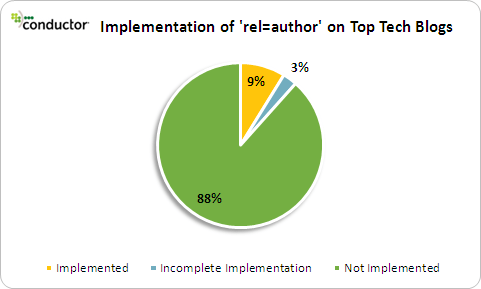While Google launched the author tags system as a way to garner interest for Google Plus, it’s actually quite the benefit to the digital content producers of the world. Those of us who have implemented the simple tweak realize that Google Authorship quickly and relatively effortlessly boosts organic clickthrough rates.
From the user perspective, there is just something more inviting about the rich media experience of rel=author tags. In the example below my post about landing pages is not the first SERP link, but the image and author tag visually distinguish it from the rest of the results. Studies back up this notion on user experience – according to an article from Search Engine Land, the rel=author tag can bring up to a 30% increase in organic traffic.
But most bloggers aren’t taking advantage of this simple tool – including, believe it or not – the vast majority of tech bloggers. Search firm Conduct generated a list of the top 250 tech blogs including recognizable names like Mashable, TechCrunch and Gizmodo. Conduct then checked for author tags on individual posts – and the results were surprising.

Conduct’s analysis showed that only 9% of the top tech blogs have implemented Google Authorship tags. Another 3% had implemented the tag, but did not link to the author’s Google Plus profile.
This study points to a missed opportunity among the very content producers we would expect to be most likely to take advantage of such a simple means for boosting organic CTRs.
Want to implement author attribution for your content? Setting up Google Authorship is fairly simple. To get started, check out this how-to from Google, or see this visual guide from Search Engine Land.
Are Google author tags boosting your organic traffic? Share your experience with us below.
